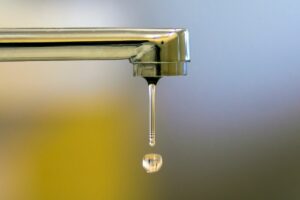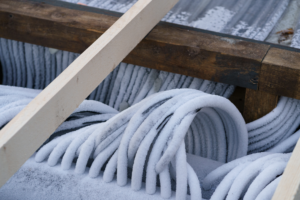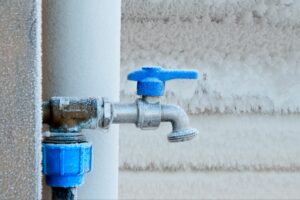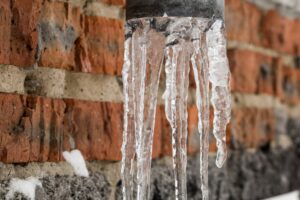Don’t Let Winter Burst Your Bubble
Winter is back with a vengeance. From unexpected cold snaps in the South to relentless blizzards in the Midwest. This winter season has brought storms, The Guardian has deemed “Once in a Lifetime.” It’s not just an inconvenience—it’s a fast track to water damage, wrecked belongings, and costly repairs.
You don’t have to wait for disaster to strike. Let’s break down why pipe bursts, how to spot the warning signs, and the best ways to keep your property safe.
Why Do Pipes Burst in Winter?
Winter conditions can cause water inside pipes to freeze, leading to increased pressure and potential bursts. Consequently, these bursts can result in extensive water damage to your property, ranging from structural issues to ruined belongings. Understanding the science behind pipe bursts empowers you to take preventive action. Moreover, proactive measures can significantly reduce the risk of such incidents.
Warning Signs Your Pipes Are About to Burst
Don’t wait until you’re ankle-deep in water — watch for these red flags:
Unexplained Increase in Water Bills
A sudden spike in your water bill could indicate an underlying leak, potentially leading to a burst.
Decreased Water Pressure
If your faucets, sinks, or showers are not delivering water with the usual force, it might be a sign of a compromised pipe.
Strange Noises
Gurgling or banging sounds in your pipes can signal impending issues.
Other Signs
If there is frost buildup on exposed pipes, damp sections of drywall, carpet, or ceilings, as well as strange smells from faucets or drains, your pipes may be on the verge of bursting.
How to Prevent Pipe Bursts
Prevention is your best defense. Here’s how to safeguard your property:
Insulate Exposed Pipes
Identify and insulate pipes in unheated areas to prevent freezing. You can insulate exposed pipes outside of your property using pipe sleeves and heat tape.
Maintain Adequate Heating
Allow your property to stay properly heated, especially in areas prone to freezing. Follow your local electricity provider for best practices in your area.
Drip Faucets
When the weather dips below freezing temperatures, allow your faucets to drip. This can relieve pressure and prevent your pipes from freezing and bursting.
Additional Tips
Follow your local guidelines to drain sprinkler systems. Store any hoses indoors and shut off water valves to outdoor faucets, leaving outside valves open. Lastly, keep any external doors and garages closed, especially if water supply lines are present.
What to Do If a Pipe Bursts
If the worst happens, act fast:
Shut Off Water Line
Promptly locate and turn off the main water supply immediately; this can help reduce the extent of damage to your property.
Open Faucets to Reduce Pressure
If you haven’t already, turn on faucets throughout your property. This should allow any remaining water in your pipes to release, reducing the pressure on the damaged area.
Initiate Cleanup with Caution
While you can start the cleanup process, especially non-electrical hazard areas, consider professional assistance. Certified water-removal companies, recognized by organizations like the Institute of Inspection Cleaning and Restoration Certification (IICRC), can assist in reducing damage.
Partner with a Public Adjuster
Working with a public adjuster can be the key difference in the outcome of your water damage claim. Notify the Premier Claims team promptly after the damage occurs. Our team will provide guidance on how to navigate the claims process every step of the way.
Why Partner with Premier Claims?
Dealing with insurance companies can feel like walking through a blizzard blindfolded. That’s where we come in. Premier Claims is your advocate, aiming for your claim to be fairly evaluated.
Winter storms are unpredictable, but your response doesn’t have to be. Don’t let winter catch you off guard. Protect your property, stay informed, and know that Premier Claims is here to help you weather the storm.
"*" indicates required fields




